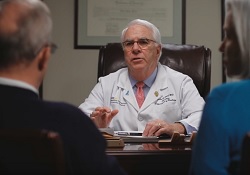By: Urology Care Foundation | Posted on: 19 Sep 2018

As we enter the heart of September, and this year's Prostate Cancer Awareness Month, Dr. John Lynch spoke with our staff from the Urology Care Foundation about his battle with the disease.
Dr. Lynch is not only a survivor, he's been treating prostate cancer patients in the Washington, D.C. region for decades. Given his unique story with prostate cancer, Dr. Lynch talked about the impact it's had on him and how it made him better.
You can also listen to this interview as part of our Urology Care Podcast:
Interviewer: Can you tell me some background on your prostate cancer journey and how you found out you had it?
Dr. Lynch: I've been dealing with prostate cancer patients for my entire career since 1979. I have a family history of prostate cancer and I had my PSA checked every year.
At one point my PSA jumped a little bit and I repeated it with what's called a free and total ratio. I had a normal PSA value but my free to total ratio was 3% which is remarkably low. In fact, I have never seen a free to total ratio that low.
I sort of convinced myself at first that it was not important because my PSA was in the normal range, but then I got a biopsy and it came back positive. I can tell you the exact day and where I was in the car. It was a gorgeous sunny day just like this. It was 3:30 in the afternoon when the pathologist called. So it's a rude awakening when you get a call like that.
Interviewer: How long had you been working with prostate cancer patients?
Dr. Lynch: I was diagnosed in 2002. I had been working with patients with prostate cancer for about 20 years.
Interviewer: Did you see a specialist in prostate cancer? How did that work out?
Dr. Lynch: Having been involved with prostate cancer patients and clinical trials for 10 or 15 years prior to that, I knew most of the other urologists in the country that were well experienced in dealing with prostate cancer patients. And I talked to a number of them and made a decision, because I was in my early 50s, that I wanted to go with a radical prostatectomy.
At that time there was no robotic procedures that were done frequently enough and so I had a...if you'll pardon the expression, an "old fashion" radical prostatectomy through an incision.
My big decision at that time was where I was going to have this done. I talked to friends in Baltimore, New York and Colorado, and elsewhere, and they were all willing to do the surgery. But then I finally realized what was more important to me. One, I had family here in D.C. and being with family through this process was extremely important. And two is, how could I really recommend to my patients that I'm going to do their surgery here when I'm not willing to do it here myself?
So that was pretty obvious to me. It took me a little while to realize that, but once I did, there was no question that I was going to get the procedure done here at my hospital.
Interviewer: Did you think you had an advantage because you knew so much about prostate cancer?
Dr. Lynch: I think there was a tremendous advantage in terms of knowing what to expect from the surgery, the potential problems that could be related to the surgery, the recovery process and knowing patients that were dealing with all this. So from that perspective I think it was a great benefit to me.
Interviewer: Do you have any advice for patients, or their loved ones, when it comes to prostate cancer?
Dr. Lynch: Mine was picked up on early detection. When I had my surgery we didn't really know what active surveillance was. If I was diagnosed today with the same disease, I would probably go on active surveillance. But I think the main thing for patients and their families to recognize is that early prostate cancer is certainly curable in most situations. Sometimes we don't need to treat it. We just need to follow it.
Early detection is the key in prostate cancer. I agree with the guidelines that our American Urological Association has produced and all the educational material that's available to patients on the Urology Care Foundation website. The key is understanding as much as you can about the disease process.
Interviewer: Do you think having prostate cancer has given you more empathy with your patients?
Dr. Lynch: I remember prior to my surgery I was walking on the New Jersey shore with my wife, and she stopped and looked at me and said, "You know, you're gonna be a better physician because of this."
I was kind of taken aback by that but looking back on that statement I think she was absolutely correct. I have more empathy, I understand what patients are going through and I understand the dilemma they sometimes face on the decisions.
Interviewer: We'll let that be the final word today. I want to thank my guest, Dr. John Lynch of Georgetown MedStar University Hospital in Washington, D.C.
As a longtime friend of the Foundation, Dr. Lynch has appeared in many of our videos and has served at Chair of our Patient Education Council. He is also the incoming president of the American Urological Association (AUA). You can watch the following videos to learn more:
Explore Further
Share Your Story
Have a story to share? The Urology Care Foundation invites you to share your experience with a urologic condition and how it has affected you or your family.
Make a Differnece
Your tax-deductible gift will help support the millions of patients who are faced with urologic disease. Together, we care.



